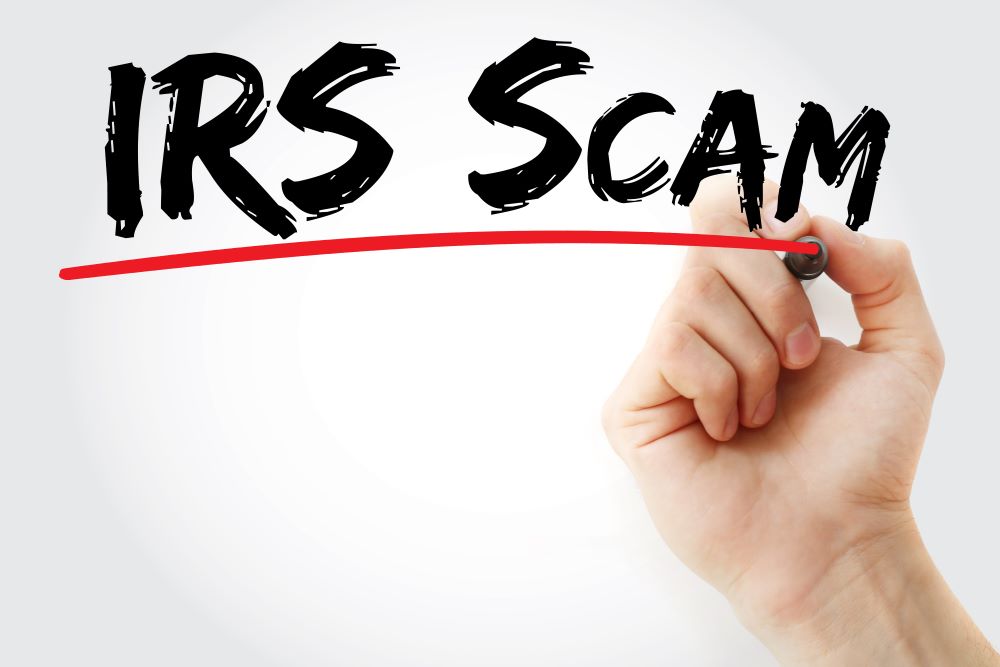IRS Releases List of “Dirty Dozen” Tax Scams for 2023

Each year, the IRS releases its “Dirty Dozen,” a list of tax scams that taxpayers should be wary of. The list highlights common scams that put people at risk of losing money, personal information, data, and more. Here are the 12 scams that you should be aware of in 2023:
Employee Retention Credit Scams. There has been an uptick in promotions regarding the ERC, but many are based on inaccurate information related to eligibility and calculation of the credit. While the ERC has been helpful to many businesses, there are very specific guidelines on who can claim the credits and how. The IRS is stepping up enforcement, so businesses are urged to be wary of promotors offering too-good-to-be-true services and results and to be diligent when applying for the ERC.
Text message and email scams. Criminals try to steal your personal information by posing as legitimate IRS or state tax agency professionals through “phishing” and “smishing” scams. They may offer fake refunds or try to scare you into giving up your information by saying you’re being charged with tax fraud. Remember that the IRS initiates most contact through mail and will never contact taxpayers through email or text regarding a tax bill or refund.
IRS Online Account setup “help.” Taxpayers are urged to be wary of scammers who try to sell or offer their help in setting up an Online Account with the IRS because it may put you at risk of identity theft. Taxpayers should not need assistance in setting up an account; allowing these scammers to help you gives them access to your personal information, which they can use to file a fraudulent return and claim your refund.
False fuel tax credit claims. Promoters improperly push fuel tax credit claims that most taxpayers are not even eligible for. This particular credit is meant for off-highway business and farming use, but some promoters and tax preparers will convince taxpayers to falsely claim the credit to inflate their refunds while collecting high fees from them.
Fake charities: Scammers may create fake charities to steal money and personal information, especially after major disasters such as wildfires or earthquakes. It’s good to be generous, but taxpayers are urged to remain vigilant about charitable donations. Take your time to do your research, verify the authenticity of the charity, don’t give in to pressure, don’t give more than you want to donate, and be wary about the method you use to donate (credit card or check is best).
Shady tax preparers. Choosing the right tax professional is crucial. Some warning signs that your tax preparer is less than honorable include fees based on the size of your refund, refusing to sign your return, asking you to sign a blank return, claiming fake deductions, inflating your return to get more tax credits, or directing your refund into their account instead of yours. Always make sure to check the credentials of your tax preparer, because you are ultimately responsible for all of the information on your tax return.
Bad advice on social media. Social media is rife with inaccurate, misleading, and fraudulent tax advice – if it sounds too good to be true, it probably is. Scams include misinforming taxpayers about documents such as W-2s or Form 8944, and encouraging people to submit false information in hopes of getting a bigger refund. Taxpayers who intentionally file fraudulent returns face significant penalties.
Spearfishing. These scams are aimed at tax professionals and businesses, which are urged to be wary of suspicious email requests that attempt to steal client data, tax software preparation credentials, and preparer identities. Subsequent data breaches can put many people at risk. Some scammers may pose as new clients and send a malicious links, while others target HR departments and fraudulently request employee W-2s.
OIC mills: Taxpayers with pending bills and claims of hardship should contact the IRS directly instead of working with an Offer in Compromise (OIC) “mill” that claims it can settle your bill for pennies on the dollar. They often charge exorbitant fees for getting you the same deal you could have gotten yourself by contacting the IRS directly to resolve your issue.
Schemes targeting high-income filers. Scammers attempt to get wealthy taxpayers to misapply tax rules, leaving them vulnerable. One example is using a Charitable Remainder Annuity Trust (CRAT) to eliminate taxable gain. By transferring, instead of selling, appreciated property to a CRAT, the assets receive a gained step-up in basis that is not recognized when then sold by the CRAT. Another is claiming the use of a monetized installment sale in exchange for a fee, which improperly delays the recognition of gain on appreciated property.
Abusive tax avoidance schemes. Taxpayers are urged to be cautious of people peddling bogus tax schemes that aim to reduce or avoid taxes altogether. These can involve illegitimate micro-captive insurance arrangements and syndicated conservation easements to improperly claim charitable deductions.
International tax scams. US residents are, generally, taxable on worldwide income. Hiding money in offshore accounts and concealing digital assets are two areas the IRS warns about. Taxpayers are also cautioned against attempting to avoid tax by making contributions to individual retirement arrangements in Malta, particularly, or other foreign countries. Additionally, IRS is on the lookout for US companies claiming deductions for the cost of “insurance coverage” with a foreign corporation.
Contact Us
If you have questions about the information outlined above or need assistance with a tax issue, Klatzkin can help. For additional information call 609-989-9189 or click here to contact us. We look forward to speaking with you soon.
©2023 Klatzkin & Company LLP. The above represents our best understanding and interpretation of the material covered as of this post’s date and should not be construed as accounting, tax, or financial advice. Please consult your tax advisor concerning your specific situation.
